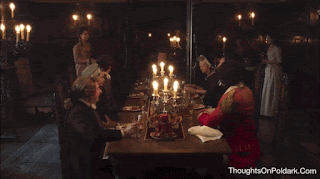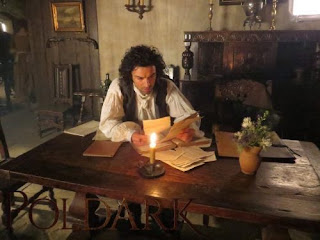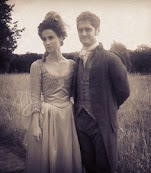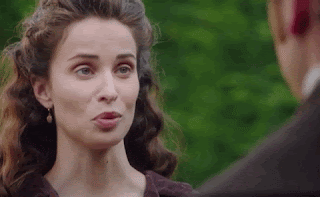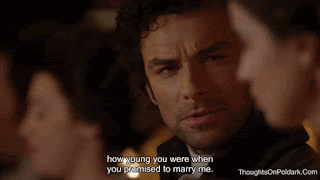The love story of Ross Poldark and Elizabeth is a story untold and one that never really was or became. That is for three reasons. Firstly, this is the case if it is to be concluded that on Elizabeth's side she never really held a true viable love for him from the start. Secondly, in the end Ross realised that what he had thought was true and real love of Elizabeth was idealisation, and thirdly it was ultimately a frustrated love story frustrated by Elizabeth herself. This was by her free choice at the start of the story not to 'keep the faith' with Ross and to marry someone else.
Considering that it was Elizabeth who ended her romance with Ross before it could properly start and become anything, this post is the first in a series of posts which looks at the 'instinct of love' in Elizabeth and as compared to that in other characters. This is in particular to her romantic dilemmas with Ross and how this contradicted the idea that she ever held this all essential real and true love for him. Therefore, specifically based on that old adage of 'actions speak louder than words' the series will look at Elizabeth's actions, thoughts, feelings and therefore her instinct to love (or not) in certain scenarios, when compared against many of the other characters who faced similar romantic dilemmas in their respective love stories.
That Loving Instinct
The theory behind this post is that, when a person truly loves someone, it is very hard for them to hide this for very long. This is particularly in certain situations where there is some kind of call to action (or if not action then a call to feeling). In those moments of crisis, or where a significant decision is to be made, then Graham's writing on how his characters answered that call, (either by their actions, feelings or their thoughts), speaks to that love or contradicts it’s existence. Aside from Elizabeth it does appear that Graham established a pattern with other characters who truly loved whereby they acted or thought in a way which accorded with a natural urge, pull and instinct of loving that person. However, as a key character and against the rest, Graham seemed to single Elizabeth out as acting differently from them. It's likely that Graham writing Elizabeth's character as out of sync with the norm when it came to the loving instinct, is not coincidental. Instead it is likely that this was part of his key message in his story of love among all the characters and for her and in respect of their individual stories. Thus meaning that her reactions were different because her feelings were too! Unlike in the real world, readers have that wonderful bird's eye view and that extra insight where they are 'outside looking in' on all the things shared by the narrator. Therefore in respect of Elizabeth and whether she truly loved, readers can assess whether the narrative Graham chose to provide around her character spoke loudly on love (as love usually does), and if it indicated that she operated by the instinctive and powerful pull of that impulse of love, or not.
The Concept Of The Separated Lovers
The segment of Elizabeth's story that this posts focuses on is before Ross's return to Cornwall and therefore Elizabeth's mindset whilst Ross was at war before the core written story even started. It speaks to a story concept that Graham repeated in different forms for many of the other characters. This is the concept of two lovers being separated by war or due to a forbidden love. The love would be tested by this separation. Where there was a true and lasting love this upsetting circumstance manifested a story of heartbreak which Graham would emphasis in narratives of a 'devastated heart' in many of his characters. Those were the ones who truly loved but were deprived of this love. These stories for some of the other Poldark characters are covered in the next post 'The Absence of A Devastated Heart'. However what is apparent is that those stories are quite distinct from Elizabeth's story. Hers is documented in this post but which will be compared with the others in the next.
A Poor But Significant Beginning-The Instinct to Reject
Indeed the story that Graham started with Elizabeth was one of rejection of Ross by her. It is true that later on there appeared to be a resumption of Elizabeth's interest in Ross. However, this appeared to be so long after by up to four years later. Also there was the conditional element of this being timed with her lost interest in Francis and seemingly falling out of love with him. That means that her love and her instinct of love towards Ross throughout even the later part of the story is still under question too.
Looking at Elizabeth's mindset before Ross returned is just the first bit of the journey to look at this issue broadly. Nevertheless it is arguable that at the start of the story her initial instinct towards rejection of Ross already told of the quality of her love at this point, and that this foundation foretold a love that would never be or never prosper even if given a second chance.
Before The Return: Absence That Made The Heart Grow Detached
A slackening Interest In Ross
Although Ross gate-crashing Elizabeth and Francis's engagement party was her first scene with him, Graham later gave some useful insights to the reader about how Elizabeth's mindset had been while Ross had been at war. Just like Caroline with Dwight when he went off to the Navy and ended up captured by the French, Elizabeth was supposed to be in love with Ross while he was at war too. Like Caroline she was supposed to be 'waiting' devotedly for his return on a promise to marry him. In that respect Caroline and Elizabeth had done the same thing in identical scenarios in terms of feelings. Essentially they both made declarations of love and at the very least an emotional promise of a commitment to 'keep the faith' during their respective separations so that once reunited they could be together in marriage.
Graham's retrospective narration of Elizabeth did not show that she had been quite the doting and committed girlfriend with an unbreakable attachment to Ross during the twenty eight months (two years and four months) that he had been away at war. He conveyed this when he wrote of Ross back at Nampara after his engagement party shock and then looking over the old letters Elizabeth had sent him while he was at war. It then made sense to Ross how she had broken her promise and agreed to marry another man in his absence. This is because in respect of a letter Elizabeth sent him six months before, Graham wrote that Ross made observations in it and that 'Reading with the knowledge he now had, there were hints of a slackening interest.' (Book one 'Ross Poldark' first and full edition) So it is apparent from this that Elizabeth had lost interest in Ross at the very least over half a year before his return.
In fact Elizabeth did eventually admit her loss of interest in Ross face to face with him in a later scene to be explored in a future posts in the series. Also this whole scene is covered in the previous post 'Just a Boy And Girl Attachment'. However what this means is that Ross had not got the wrong impression in hindsight from her letters after all, and the reader does not need to speculate on this issue either. There is no dispute or uncertainty that Elizabeth's attentions turned elsewhere while Ross was away. This is clear from Elizabeth's later admission. Instead of growing fonder, more in love and in need of that love for Ross, Elizabeth's heart had grown detached and disinterested in him. Obviously at this early stage this does not accord with her having held a strong and compelling love for him. Along with the idea that absence tests a true love by extinguishing the ones that are not real or strong, whilst inflaming the ones that are, again this could mean that the discussion over whether Elizabeth truly loved Ross ends here before the story has even started. However there is so much more that Graham provides that continues to build on to this narrative. Elizabeth: Ross Who?
While the Cat Is Away The Beloved Did Play
There is more retrospective narrative about Elizabeth's mindset and her natural urge not to love and be devoted to Ross while he was away. If Elizabeth's love for Ross was true, then one would expect that even if circumstances pulled her to go with Francis in Ross's absence, that she should have at the very least felt torn between loving and wanting to wait for Ross and then new feelings of love for the new man (Francis) that had come into her life. However Verity's account of how Elizabeth and Francis came together helps give an impression on this and does not indicate there was much of a struggle at all for Elizabeth on this.
Verity explained to Ross that there had been an instant and organic connection between Elizabeth and Francis when they happened to meet at a party in Truro. She continued that just as with clouds, rain and lightening "...it came from outside them." Verity also mentioned that she had spoken to Francis herself saying "Naturally I told him you had been -friendly with her. But she had already told him that." Thus, this gives the impression that Ross was not a stumbling block for Elizabeth in her decision to start a new relationship with someone else. There is no narrative to suggest it was difficult and in her face to face with Ross later on, Elizabeth actually gives this impression that it really was not.
Graham's Missing Concept Of The Stumbling Block For Another Love
The reader would find that Graham often repeated this concept of 'the stumbling block lover' in the love stories of other characters. This would be during the lovers’s times of separations. So essentially, despite this separation their love for each other was so deeply felt by them and so strong that it presented as a 'stumbling block' for them to move on and find love elsewhere. For instance, as discussed below, Drake's real love for Morwenna meant that she was a stumbling block for Rosina Hoblyn in her courtship with Drake. Clowance's love for Stephen Carrington meant that he too was a stumbling block for her with other suitors who expressed interest in her. Yet Graham did not seem to make Ross a 'stumbling block' or 'obstacle' in Elizabeth's courtship with Francis. If Ross had been, then it is likely that Verity would have offered this at least as some sort of consolation for Ross in his distress. Especially as in his hurt he was making some bitter and sarcastic comments to Verity as he listened to her essentially communicate that Elizabeth had betrayed and broken her promise to him with some ease and without much of a struggle with her conscience. Presumably Verity could not offer this consolation because it was not true. More importantly neither did Elizabeth ever offer this consolation too. A Self Confessed Uncommitted Girlfriend
Indeed as Verity's account of how Elizabeth and Francis came together made no suggestion that Elizabeth had been in two minds or battled an internal conflict over it, the narrative points to Elizabeth being quite uncommitted to Ross. This surely would not have been the case if she had truly loved him.
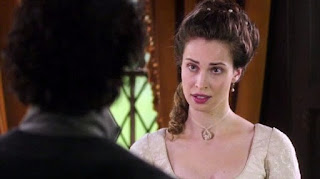
Elizabeth -The Love Cheat (Out of Sight-Out of Mind)
As Elizabeth continued with Ross in this third meeting with him, she said that "Then came word that you were dead." In this there is a reminder that Elizabeth chose to court with Francis at a time when she thought Ross was alive. Therefore it could not be pleaded on Elizabeth's behalf that she only pursued an interest in another man because she thought she was free and no longer committed to a man who then was not alive. But even if she did think Ross was dead, whilst she would have been technically free to try and move on with a new romance, her moving on quite quickly and without absolute confirmation based on a rumour, does not give the impression that she was very much emotionally invested in Ross in the first place as he was in her.
In the modern world Elizabeth did then effectively ‘cheat’ on her boyfriend Ross while at the same time sending him letters allowing him to still think she was waiting for him to return when she would marry him. Even if there was no official and formalised engagement announcement, they had made this emotional commitment privately to each other. Even still without this they were still essentially boyfriend and girlfriend and this relationship had continued in their letter communication. Letter communication was a key method of sustaining love affairs in the 18th century whether the man was at war or just in the next town. Whilst 'dumping' Ross by letter while he was at war and living only to return to her would have been the honest but not the easiest thing to have done, for this post the focus is what the scenario says about Elizabeth's mindset. This is that, she just was not emotionally dedicated to Ross as her first love. Her actions and even her words to Ross contradicted the idea that she held a true love for him when she did not act with this impulse. Also there is no narrative in the book or any comment by Elizabeth herself indicating that other than fearing he was dead, that the rumour of Ross's death had greatly unnerved her, caused her any significant distress or even a period of grieving.
The 'Fictional' Excuse of Parental Pressure
The Myth of the Arranged Relationship And Marriage
Typically and as perpetuated by the last television adaption of Poldark there is this notion that Elizabeth's instinct to love Ross was quashed by parental pressure. To the extreme there can be a notion put that perhaps she even suffered parental force or manipulation to marry Francis and not Ross. In light of Uncle Charles's evasive demeanour in the prologue and on the topic of Elizabeth, this theory can even be stretched to imply that Francis and Elizabeth were brought together by some arrangement by Charles, or him together with Elizabeth's parents. However this theory is easily debunked by no clear suggestion through the narrator informing the reader of this or by any character in the books. This includes Elizabeth herself when years later she tells Ross why she chose Francis over him and also Verity's recounting of their meeting at a party and falling for each other naturally.
However scenes from the recent 2015 television adaption do convey a new narrative which suggests that Elizabeth was in some way coerced into marrying Ross. There is the adaption only scene of her waiting for Ross to see her before she married Francis. Elizabeth's mother is then shown having a stern word with her against this. Following this (although Elizabeth in the book and television story had actually already and happily agreed to marry Francis) the direction in the adaption was that this talk is what prompted Elizabeth to confirm her agreement to marry Francis who is shown visiting her for this reassurance. While this was essentially 'fan fiction' by the scriptwriter these scenes or the ideas they perpetuated are certainly not part of the original story as told by Graham. Evidently the television adaption which remodelled Elizabeth's character into a more softer and nicer one than the original character in the books, also sought on this occasion to strip her of the agency that she carried in the books too. Even though she was prone to a change of mind after the event, at the times she did make decisions in the original story she did them with her own mind and often justified her decisions with firmness afterwards.
An Instinct preferring Francis
The problem with the case that Elizabeth was 'made to marry Francis' is that not only does this require evidence of force or pressure on her, but it also requires text narrating that marrying Francis was against Elizabeth's personal wishes and that if not for her parents she would not have wanted to marry Francis and would not have done so. But the two ideas of her parents wanting this marriage and Elizabeth also wanting it too can exist together and appear to do so in Graham's original story in the books. This does mean that whilst Graham's narrative does document that Elizabeth's parents and Uncle Charles were eager for her to marry Francis, Graham documents that Elizabeth was too. He wrote in the first and full edition of the first book that as Francis made a toast to Elizabeth at their engagement dinner, that 'Elizabeth smiled brilliantly up at her lover.' There is no counter narrative in the books to strongly suggest that Elizabeth was at odds with her parents wishes in any way, that she didn't want the same, that she was somehow reluctant and that she felt pressure around this issue. But if Graham wished to make parental pressure part of Elizabeth's story he showed he could do this as he did in Morwenna's story. There he left no doubt of clear pressure on Morwenna to marry Reverend Whitworth by documenting behaviour by Elizabeth and George that was in the nature of emotional and practical manipulation. He chose not to do this in Elizabeth's story. Therefore it is not her story as told.
Ultimately whilst some may have inferred that Elizabeth was pushed into courting Francis, Graham's narrative implies that the reverse is true on two other accounts in addition to the rest above. One of the first things Elizabeth had said to Ross when he returned from war at her engagement dinner was "I must explain..." and "What can you think of me?" But in Elizabeth’s key meetings with Ross, including one years later, she never ever suggested to him that parental pressures to marry Francis was a factor for her. If it were true, one would expect that she would rush to offer this explanation as it would be the easiest and still an honest way to win his sympathy, understanding and less harsh judgment of her without actually lying.
Secondly Elizabeth also told Morwenna and Ross that she had chosen and married Francis for love. She particularly told Ross that she had married Francis because she thought she loved Francis better than him (Although in the last television adaption her admission of this and that she had never believed Ross was dead at war was reworded to a question rather than a statement). This admission as written in the books confirms that in fact Elizabeth's loving instinct at the time of Ross being away, and even on his return was a feeling of desiring and wanting to be with Francis more than she did with Ross. This had developed in her from her first meeting with Francis and thereafter from her courtship with him where she thought they shared the same tastes. Whatever instinct Elizabeth had had about Ross it was not enough at the time to overtake her feeling for Francis and her impulse of feeling more love for Francis and to choose him. Also as alluded to above there was no suggestion of a 'devastated heart' of Elizabeth while Ross was away or feared dead. Neither was there a clear narrative of a 'regretful heart' on the realisation that Ross was indeed alive and back in town. The question of eventual regret did not arise until four years later when Elizabeth turned up at Nampara the day after Ross had slept with Demelza and she considered herself 'too late'.
The next post will focus of the differing reactions by other characters who faced the same scenario of separation from their loves as Elizabeth did. It will focus on how their devastated hearts contrasted wildly from Elizabeth who unlike them also chose to replace Ross with another love during their separation. This is in the (upcoming) post 'Elizabeth: The Absence of a Devastated Heart'. Following that post will be 'A Childish Promise To Marry Ross' which covers Elizabeth's reflections years later on her marriage promise to Ross, on him as her first love and how her lack of sentimentalism continued to show a lacking loving instinct in her which did not fit the conventional for a woman who truly loved.

